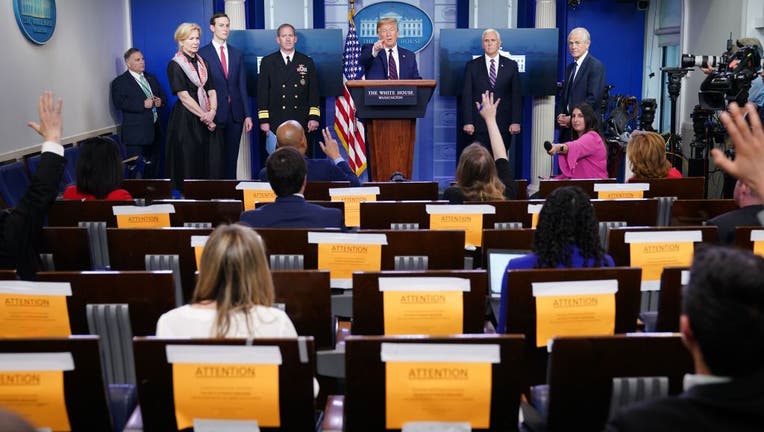White House considering direct payments to hospitals to cover COVID-19 treatment for uninsured

US President Donald Trump speaks, flanked by (From L) Response coordinator for White House Coronavirus Task Force Deborah Birx, Senior Advisor to the President Jared Kushner, Rear Adm. John Polowczyk, US Vice President Mike Pence and Director of Trad
WASHINGTON - The White House is considering issuing direct payments to hospitals to cover COVID-19 treatment costs for uninsured Americans, Vice President Mike Pence announced during a White House Coronavirus Task Force briefing Thursday.
Based on an analysis of the costs to treat pneumonia, Axios estimates that the average cost of of hospitalization for COVID-19 will likely be more than $20,000.
According to the U.S. Census Bureau, 8.5% of the American population, or 27.5 million, did not have health insurance at any point in 2018.
RELATED: CoronavirusNOW.com, FOX launches national hub for COVID-19 news and updates
Some health insurance companies had previously announced they would waive the copay costs for policyholders' COVID-19 treatment.
The news came Thursday, the same day that the number of confirmed novel coronavirus cases across the world crossed 1 million. The United States remains the country with the largest amount of confirmed cases at 242,182 as of Thursday night.
RELATED: Who is most susceptible to coronavirus? COVID-19 not just affecting older people
Italy, the country with the second-highest amount of confirmed cases, had 115,242.
U.S. residents who recently lost their jobs or had employer-sponsored health care may still qualify for plans available through Healthcare.gov. Options through COBRA and Medicaid may be available, depending on a person's situation.
Over 6 million Americans applied for unemployment benefits this week, according to reports.
Across the country, citizens in major U.S. cities and states remain under stay-at-home orders and are being urged to practice social distancing guidelines.
RELATED: Social distancing: What to do and what not to do to slow the spread of COVID-19
Meanwhile, there still remains a lack of necessary medical supplies, such as N95 masks and ventilators, at health care organizations across the country.
Doctors, nurses and other health care workers across the United States are frustrated that they have to care for sick people without proper equipment. Some have held demonstrations; others are buying their own supplies.
For most people, the new coronavirus causes mild or moderate symptoms, such as fever and cough, that clear up in two to three weeks. For some, especially older adults and people with existing health problems, it can cause more severe illness, including pneumonia, and death.
The Associated Press contributed to this story.



